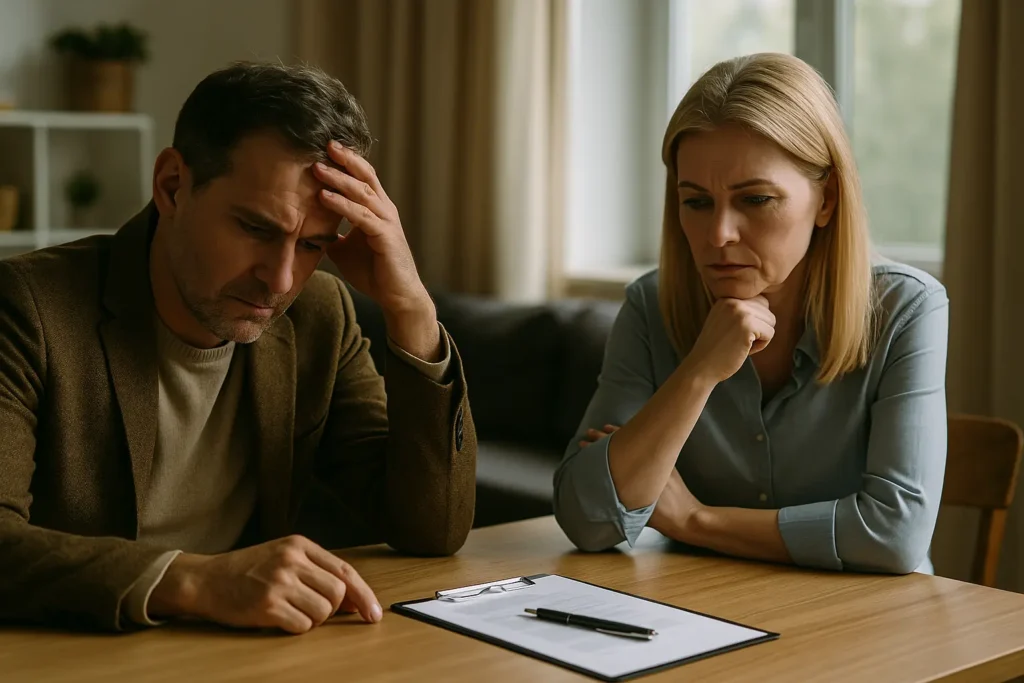
Divorce often brings to mind heated disputes and lengthy courtroom battles, but it does not have to unfold that way. Many couples choose a different approach that reduces stress, cuts expenses, and protects privacy. Divorce without trial offers a path that focuses on problem-solving instead of winning arguments. It allows couples to settle important matters like property division and child custody in a way that fits their lives. This approach not only avoids the drama of a courtroom but also helps families move forward with greater stability.
Why Couples Choose to Avoid Trial
Control Over the Outcome
In a courtroom, a judge decides property division, custody, and financial arrangements. When couples settle outside of trial, they keep control of those choices. This freedom gives both sides the ability to shape agreements that fit their lives rather than having rules imposed on them.
Lower Financial Burden
Courtroom battles often involve high legal fees, extended timelines, and hidden expenses. Mediation or negotiation typically costs less, saving resources for each party to use in rebuilding their lives.
Protecting Children
Children often feel caught in the middle when parents argue in court. Resolving disputes privately helps shield them from tension. It allows parents to present a united front in focusing on their children’s needs.
Preserving Privacy
Trials are often part of the public record. When couples choose mediation or settlement, personal details remain private, giving them a chance to handle sensitive matters away from the spotlight.
Alternatives to a Divorce Trial
Mediation
Mediation involves a neutral third party who helps both sides communicate and reach agreements. The mediator does not make decisions but encourages discussion and compromise. This method suits couples who want to remain civil while protecting their interests.
Collaborative Divorce
In collaborative divorce, each spouse hires their own attorney but commits to resolving issues outside of court. Everyone agrees to work through disputes respectfully. If talks break down, both attorneys withdraw, and the case may go to trial. This setup motivates both sides to keep negotiations productive.

Settlement Conferences
Sometimes couples attend settlement meetings with their attorneys to iron out agreements before trial begins. These discussions can cover property division, custody schedules, and support obligations.
Arbitration
Arbitration allows a neutral decision-maker, chosen by both parties, to hear the case and make binding decisions. This process resembles a trial but is usually quicker, less formal, and private.
The Role of Communication
Divorce without trial depends heavily on communication. Couples who can speak honestly, even through attorneys or mediators, find resolution more quickly. Listening matters just as much as expressing needs. Both parties benefit when they replace accusations with problem-solving.
How to Prepare for Out-of-Court Divorce
Organize Financial Records
Keep track of income, assets, debts, and expenses. Having documents ready makes negotiations smoother and prevents surprises.
Set Clear Priorities
Know what matters most to you, whether it’s custody arrangements, property division, or financial stability. Being flexible on lesser issues makes it easier to reach agreement on the most important matters.
Stay Open to Compromise
Rigid demands often lead to deadlock. Compromise does not mean giving up everything; it means finding middle ground that allows both parties to move forward.

Work with Professionals
Attorneys, financial advisors, and mediators bring structure to the process. They help clarify confusing details, explain rights, and guide discussions toward resolution.
Benefits of Avoiding Court Drama
Faster Resolution
Trials often drag on for months or years. Mediation or settlement talks can lead to resolution in weeks, giving couples more time to focus on healing and rebuilding.
Healthier Emotional Recovery
Conflict wears down both parties. Avoiding a trial reduces hostility and helps spouses part ways with less resentment. This calmer approach supports long-term peace, especially for parents who will continue to share responsibilities.
Stronger Co-Parenting Foundation
Parents who resolve divorce outside of court often create more cooperative parenting plans. These agreements support consistency for children and reduce conflict in future interactions.
Common Challenges and How to Handle Them
High Emotions
Divorce brings strong feelings. When anger or frustration flares, negotiations can stall. Taking breaks or working with a mediator helps keep discussions focused.
Mistrust
If trust has broken down, it may be hard to believe the other spouse will act fairly. Clear documentation and the involvement of attorneys create accountability and reduce suspicion.
Unequal Power
Sometimes one spouse feels more dominant. Mediators and collaborative attorneys step in to balance the discussion and make sure both sides have a voice.
Practical Tips for Couples
1. Keep Children Out of Arguments
Never involve children in disputes. Shielding them preserves their emotional well-being.
2. Focus on Solutions, Not Blame
Dwelling on past mistakes rarely helps. Concentrating on workable solutions builds progress.
3. Use Neutral Language
Words matter. Neutral, respectful language avoids escalation and makes compromise easier.
4. Take Breaks When Needed
If emotions overwhelm discussions, pausing can prevent conflict from spiraling out of control.
5. Think Long-Term
Divorce settlements shape financial and family life for years. Focus on agreements that will work not only now but in the future.
When Divorce May Still Go to Trial
Sometimes avoiding trial is not possible. Cases involving abuse, hidden assets, or refusal to cooperate often require court intervention. In those situations, judges protect rights and enforce fair outcomes. Even so, many couples reach agreements on smaller issues before stepping into court, which limits the scope of the trial.
The Bottom Line
Divorce does not always require the harshness of trial. Couples who explore mediation, collaboration, or settlement often find quicker, cheaper, and more peaceful resolution. Communication, preparation, and compromise pave the way for success. While some situations demand a courtroom, most families benefit from finding solutions outside of it.
By approaching divorce with focus on resolution instead of conflict, couples protect their children, preserve privacy, and move forward with less drama. Avoiding trial is not about winning or losing; it is about creating a foundation for life after divorce.
Frequently Asked Questions

eBooks
If you want to know more about what you can do, CLICK the button below to get your FREE E-book:
Other Articles you may be interested in regarding the default judgments include:
- How to Effectively Utilize Social Media and Text Message Evidence in a Texas Divorce Trial
- Can You Appeal the Division of Property Outcome From Your Divorce Trial?
- What to Expect at a Texas Divorce Trial A Step-by-Step Guide
- I have been served with Divorce Papers – What do I do now in Texas?
- How to Draft and File an Answer to a Texas Divorce – Free Downloadable Forms
- Waivers – To sign or not to sign? The answer is don’t do it!
- What is mediation?
- Obtaining a copy of your Final Order
- What does it mean to go to trial in a Texas family law case?
- Opening Statements in a divorce trial



